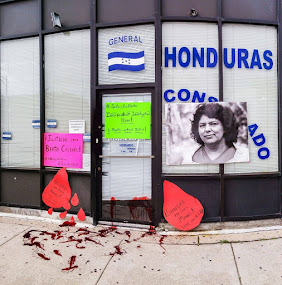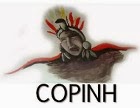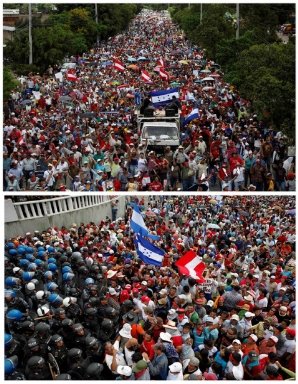 Interview with Berta Cáceres of Civil Council of Popular and Indigenous Organizations of Honduras (COPINH)
Interview with Berta Cáceres of Civil Council of Popular and Indigenous Organizations of Honduras (COPINH)
The leader of the resistance to the coup d'etat affirmed last Sunday that the people with the most wealth were the ones who lined up to vote. And that very difficult times are coming because "they are legalizing the human rights violations."
Berta Cáceres doesn't look her 38 years, and it would be hard to guess that she is a mother of four. Much less that she is one of the most combative leaders of the Honduran resistance. But as soon as she starts to talk the sweetness on her face and the kindness of her gestures are lost in the frustration and emotion of the story. “They are legalizing the human rights violations and difficult times are coming," predicted the leader of the Feminists in Resistance movement and veteran leader of COPINH, the Civil Council of Popular and Indigenous Organizations of Honduras.
Passing through Buenos Aires to participate in the second International Conference for the Abolition of Foreign Military Bases, Cáceres spoke yesterday with Página/12 (an Argentinian newspaper). The ratification of the coup d'etat that the Congress voted on Wednesday neither surprised nor depressed her. “It was logical," she indicated with disinterest and resignation while she finished her breakfast.
Cáceres isn't interested in arguing about the agreement that didn't even live up to the negotiations which themselves didn't get anywhere. In the last few months she has had to go from ministry to ministry looking for three of her eleven sisters and brothers. Her older sister was tortured and although she was able to get her out of jail, she is still being prosecuted for sedition. The military and the coup-makers know her name, but still her gaze is on the future. That is all that is left.
–The detentions and repression lessened after the massive protests in the streets stopped?
–The Resistance stopped mobilizing massively, but increased its organizational work in the communities. Look, it got to the point that we would just stand in front of the Pedagogical University and couldn't walk even half a block before they started beating us and throwing tear gas. So we changed, but the repression also changed. The dictatorship started carrying out direct attacks on the neighborhoods so that people would realize we are living in a true state of siege. The neighborhoods had organized themselves for night protests, in the supposed security of their neighborhoods and amongst neighbors. What did the military do? They went in and tremendously repressed the young people. After repressing, beating and torturing the young people at the front of the barricades, they when house to house throwing tear gas as if they were passing out newspapers. Nothing mattered to them, whether there were kids, elders or sick people. They broke down door after door to plant terror in the neighborhoods. And as if that wasn't enough, in a short time they installed the culture of informants. It could be any neighbor, they have created an army of informants.
–Did the dictatorship succeed in polarizing and dividing all sectors of Honduran society?
–The situation is very polarized. Look what they did on the circus of November 29th. The upper middle classes had never gone out to vote in such quantity. They lined up to vote. In the neighborhoods, though, where most of the population is, there the majority stayed home. I was in Tegucigalpa and after went through all the communities of the West to get to Paraíso (a city close to the Nicaraguan border). It was deserted, a complete rejection of that circus by the people. There were neighborhoods where the people didn't allow anybody through to the polling places, in others no more than 20 or 30% of the people voted. But it was a very difficult situation. The repression the week before the elections was hard, super hard, and the day of the elections there were thousands of soldiers, reservists and police.
–And despite that there haven't been many denunciations recently...
–The dictatorship is very smart and they don't put the military in front of the cameras of the international media. But I saw it. In Tegucigalpa there were tanks with M-60 machine guns, listen, M-60 machine guns! What do they need that for if we are an unarmed, poor people? And that didn't just happen in Tegucigalpa, but in the whole country. I'm not from Tegucigalpa, I'm from a place called La Esperanza, an indigenous region in the southwest part of the country. In my town, three weeks before the elections they went around with tanks and machine guns. First some coup functionaries came to take down a plaque thanking the Cuban people for their help after Hurricane Mitch. They took it away and put up a statue honoring Micheletti and the armed forces. The next day 800 reservists came and behind them came Romeo Vázquez Velázquez (chief of the armed forces) with Micheletti to inaugurate the plaque. Two days later the Liberal candidate Elvin Santos came and 48 hours after the other candidate, Porfirio Pepe Lobo, was going to come, but he wasn't able to because we organized a huge protest.
–How is the Resistance now that the coup is completely consummated?
–We as a movement, as a political and social force, have important challenges. One of them is to adapt and re-arrange the social strength and the experience we have acquired in a new joining of political-electoral forces to make a path towards the convening of a Popular and Democratic National Constitutional Assembly. That is now one of the main points of the Resistance; only a Constitutional Assembly can truly reverse the coup d'etat. The coup-makers made a mistake because they believed that the popular resistance would only last four days, but the Honduran people took a mature step. Now they know the importance of a Constitutional Assembly for recovering the people's sovereignty, all sorts of rights and re-founding the country. What is important is to continue with what we have been doing and also work towards the creation of a political-electoral alternative. The coup-makers will not be comfortable, we are going to give them a headache.













No comments:
Post a Comment